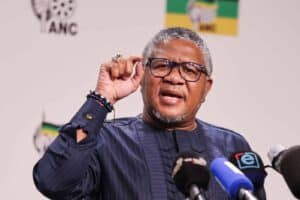The ATM has accused the DA and ANC of wanting to sideline smaller political parties.

Deputy President Paul Mashatile has lamented the “frequent collapse” of coalitions at a local government level, saying the instability was deliberate.
Mashatile was speaking during the national dialogue on coalitions governments hosted at the University of the Western Cape (UWC) in Cape Town on Friday.
The two-day dialogue, which seeks to create a viable framework for coalitions, was attended by various leaders from government, political parties and civil society.
Coalition have generated a great deal of debate ahead of the 2024 general elections.
However, questions have been raised as to whether political parties will be able to find each other in policy terms.
‘No minor matter’
Delivering his opening address, Mashatile said the discussion on coalitions was several years late because the “distressing scenes” of instability across the country’s municipalities could have been avoided, but stressed that the dialogue was an important step in the right direction nonetheless.
“Our pursuit of national consensus on how to approach coalition governments is a matter of national interest. Properly handled, it has the potential to bring the necessary stability, especially to the local government sphere, despite the intemperance we have witnessed in relation to coalitions,” he said.
ALSO READ: ‘Democracy is maturing’: SA’s parties shift alliances for post-2024 era
Mashatile also spoke about the coalitions framework document which discusses career politicians without any prospects of employment elsewhere, who face a constant risk of job insecurity.
“This is no minor matter. It is closely related to a broader sociological characteristic of South African society, which manifests the continued racial imbalance in the distribution of opportunities, wealth, poverty, unemployment, and inequality,” he continued.
The deputy president further emphasised that the future of South Africa depended on the outcome of engagements on the dialogue, which may result in legislation.
‘Coalitions should be transparent’
African National Congress (ANC) secretary-general Fikile Mbalula also delivered his speech on behalf of the ruling party on Friday.
Mbalula said the ANC maintained its view that the party that has won the largest votes should lead the coalition in that municipality
“Executive positions should be allocated in proportion to the votes obtained by coalition partners. Coalition governments should reflect the will of the people, not elite deal-making among parties,” he told the gathering.
The ANC secretary-general also indicated that the ANC was in support of thresholds where parties with less than 1% of support would not be granted a seat.
READ MORE: Political chess: ANC’s coalition fix ahead of 2024 general elections
“A threshold should be introduced so that there is a degree of legitimacy with regard to what amount of electoral support qualifies a party or candidate to be part of councils and coalition governments,” he said.
Mbalula further proposed that motions of no confidence should not be abused.
“Coalitions should be transparent and accountable to the people in their jurisdiction by giving quarterly reports and accounting to citizens on service delivery progress and milestones.
“There should be an independent dispute resolution mechanism established to deal with any disputes among coalition partners,” he said.
‘Law making is tough’
Democratic Alliance (DA) Siviwe Gwarube said there should be one motions of no confidence in year, however, it can be flexible in an instance where the law has been violated by a politician.
Gwarube also pointed out that an electoral threshold removed parties who did not enjoy the confidence of the voters.
“Currently, there are parties who have seats but have less votes than the seat quota. All political parties represented in Parliament need to work together. Law making is tough and will require robust debate. Unstable coalitions will cause chaos and lack of service delivery,” she said.
The DA will host a “national convention”, which will discuss the party’s “moonshot pact”, on 16 and 17 August.
RELATED: DA’s moonshot pact ‘created a difficult problem’ by excluding PA and EFF
The pact is aimed at preventing a possible EFF-ANC coalition from running the country post-2024 election era.
Meanwhile, African Transformation Movement (ATM) president Vuyolwethu Zungula accused the DA and ANC of wanting to sideline smaller political parties.
“This sort of bias sends us backwards,” he told the gathering.
Zungula rejected the proposals tabled at the dialogue and questioned why the discussions were held before the general elections.
Support Local Journalism
Add The Citizen as a Preferred Source on Google and follow us on Google News to see more of our trusted reporting in Google News and Top Stories.






